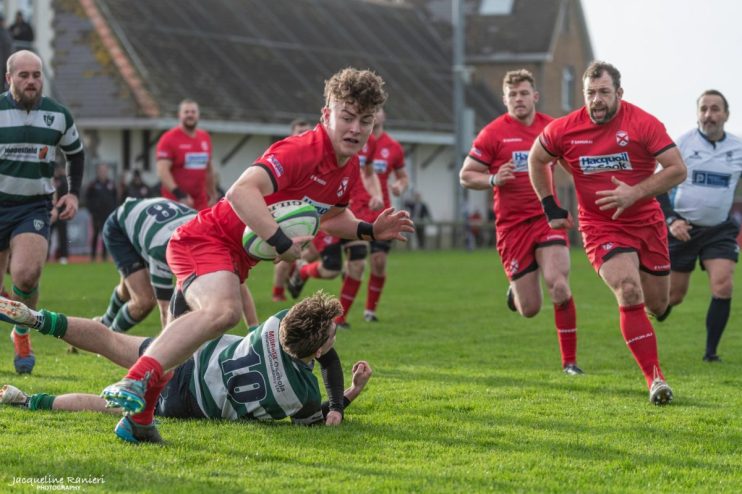Jersey RFC: The club resetting how rugby can be done

This Saturday, while England take on Australia in the Autumn Nations Series, Jersey RFC will be hosting London Welsh in a top-of-the-table clash in Regional 1 South Central, the fifth tier of English rugby.
A decade or so ago this could have been a Premiership fixture, but rugby finances in south London and in the Channel Islands followed similar paths, declining and becoming non-existent.
London Welsh were forced to start again from the bottom of the English pyramid, in the 10th tier, while Jersey’s amateur side started in the seventh step having been able to reincarnate as Jersey Rugby Football Club, who owned the Reds’ assets.
“We were lucky with the financial aspect,” Jersey chair Dan McAlister tells City AM. They kept their facilities because the failed Reds were just a tenant of Jersey RFC, who had the foresight to separate the two entities.
The result? Crowds are expected to edge towards 2,000 this weekend – incredible for the fifth tier – and Jersey have around 600 youth players training every Sunday.
Three year plan
“We need to sit down in the summer and look at a two-to-three-year plan. It has been a little bit hand-to-mouth this year,” McAlister adds.
“We didn’t have a business licence to employ people at one point but we talk about sustainability, we’ve had two under-18 academy products play for us this season so that’s the model.
“What is the strategy? We need to think more like a business but the model is about not changing. It is about a community that loves rugby.
“When I came over there were half a dozen sides on the island. Rugby’s always been a thing; that appetite is still there.”
Jersey pay to be part of the English fifth tier; while a central funding pot helps them out, they need to cover the cost of the visiting teams.
But the club have cut their cloth since the Reds were kicked out of the pyramid. They, alongside the government, Visit Jersey and local charities, work together to use the asset that is Jersey RFC.
And the man who cuts the grass, runs the sessions, helps with odd jobs and acts as head of rugby, Myles Landick, has been one of the keys to the club’s survival.
He welcomed the Springboks to the island last week and led a session involving the world champions and local youths, which parents said would be life-changing for their children.
The Jersey buzz
“There’s now a buzz starting to come back,” says Landick. “Down here there’s not a spare bit of grass that’s free on a Sunday.
“The women’s side got promoted last year. The men’s side are level five now and unbeaten. We’re going in the right direction. There’s a lot of smiles on their faces. The kids are enjoying it.”
Rugby across the British Isles is in something of a state. In England, three top-flight clubs fell by the wayside and the game is facing an urgent need to modernise.
In Ireland, local clubs have suffered due to regional dominance. Wales has a funding crisis overshadowed by seemingly endless infighting. And in Scotland the pathways need so much more backing that the national team is forced to look overseas for talent.
But an hour from London, in the Crown Dependency of Jersey, a beacon is burning for the future of the sport.
“I don’t think us in the Championship is the future anymore,” says McAlister. “We have London Welsh over this weekend but they’ve taken stock too.
“There’s no need [for us to be there]. The Championship is not where we are. Everything has got to be sustainable, it’s not a cottage industry for us.”
Sometimes clubs need to recognise what they do and don’t have. Some Premiership owners have taken supporters for granted, while some clubs in other sports have fallen victim to bad circumstances.
But in Jersey there’s a set-up that reflects the realism of rugby in 2024, where the finances check themselves while kids can thrive. It’s a model others should look to to save the grassroots future of rugby.